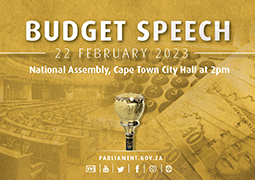
On revenue and tax proposals in the 2023 Budget, Minister of Finance Mr Enoch Godongwana said tax revenue collections for 2022/23 are expected to total R1.69 trillion. This amount exceeds the 2022 budget estimate by R93.7 billion, and the 2022 Medium-Term Budget Policy Statement (MTBPS) estimate by R10.3 billion. Over the medium-term, revenue projections are R6 billion higher than the estimates in the 2022 MTBPS. As a result, the 2023 budget included no major tax proposals.
The improvement in revenue is due to higher collection in corporate and personal income taxes, and in customs duties. This partially offset the lower value-added tax estimates. South Africa is also reaping the benefits of a more efficient and effective tax administration, which is building trust to increase voluntary compliance and boost revenue collections.
In addition and to promote investments in renewable energy, the general fuel levy and the Road Accident Fund levy will not be increased this year. To ease the impact of the electricity crisis on food prices, the refund on the Road Accident Fund levy for diesel used in the manufacturing process, such as for generators, will be extended to manufacturers of foodstuffs. This takes effect from 1 April 2023 for two years.
The personal income tax brackets will be fully adjusted for inflation, which will increase the tax-free threshold from R91 250 to R95 750. Medical tax credits will also be increased by inflation, to R364 per month for the first two members, and to R246 per month for additional members.
The retirement tax tables for lump sums withdrawn before retirement and for lump sums withdrawn at retirement will be adjusted upwards by 10 per cent. This means that the tax-free amount that can be withdrawn at retirement increases to R550 000.
On expenditure proposals, Mr Godongwana said the 2023 budget proposals reflect the government’s priorities by making targeted allocations for specific programmes. Over the medium-term, more than 60 per cent of non-interest expenditure will go to the social wage, while spending on buildings and other fixed structures – such as roads and dams – will increase from R62 billion in current year to R104.2 billion in 2025/26.
“We are increasing allocations to key frontline departments above existing baselines, moving toward a change in the composition of spending from consumption to investment, maintaining a large social security safety net, while striving for sustainable levels of debt. “This is not an austerity budget. It is a budget that makes tough trade-offs in the interests of the country’s short- and long-term prosperity. The 2023 Budget allocates additional funding totalling R227 billion over the medium term. There are several priorities that will be funded through this additional money.
R66 billion is allocated to Social Development over the medium term, with R36 billion to fund the extension of the Covid-19 social relief of distress grant until 31 March 2024. R30 billion will be used for inflation-linked increases for other social grants. As a result:
* The old age and disability grants increase by R90 on 1 April 2023 and a further R10 on 1 October 2023. The result is a total increase to R2 090.
* The child support grant rises from R480 to R510 on 1 October 2023, while the foster care grant increases from R1 070 to R1 130 over the same period.
* R23 billion and R22 billion will be allocated to health and basic education respectively, to cover the shortfall in compensation budgets and to improve services.
* R8 billion is allocated for basic services through the local government equitable share.
R14 billion is allocated over the medium term to fight crime and corruption, with the following specific allocations:
* The South African Police Service is allocated R7.8 billion to appoint 5 000 police trainees per year.
* The National Prosecuting Authority receives R1.3 billion to support the implementation of the recommendations of the State Capture Commission and the Financial Action Task Force.
* The Department of Defence is allocated an additional R3.1 billion to enhance security on South Africa’s borders.
Finally, an injection into the budget of the SARS is proposed. In addition to a direct allocation for capital and ICT projects, provisional allocations are set aside to improve revenue raising capabilities of SARS.
Mr Godongwana also tabled the second adjustments appropriation bill for the 2022/23 fiscal year. He said the Bill proposes an allocation of R45.6 billion to provide for the carry-through costs of the 2022/23 public-service wage increase. R1 billion is allocated to South African Airways to assist the carrier with the business rescue process. The South African Post Office is allocated R2.4 billion. The allocations for these state-owned companies will be accompanied by strict conditions to ensure sustainability, accountability and transparency. If the conditions are not met, the money will not flow.
Jabulani Majozi
23 February 2023

